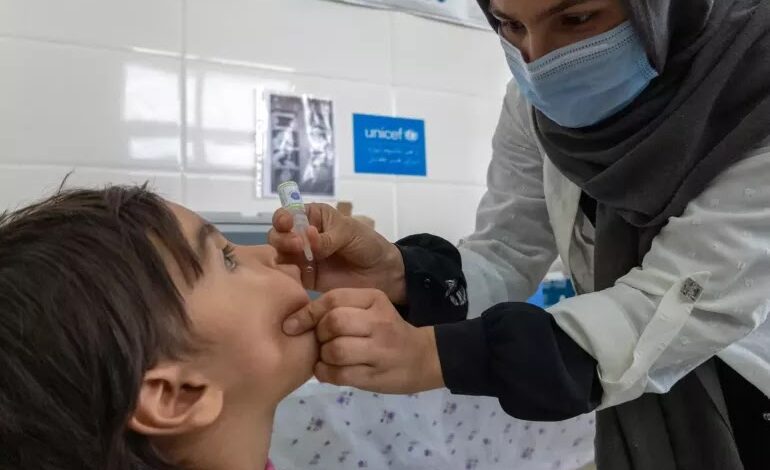85% of Children Affected by Polio Live in Conflict Zones


On World Polio Day, UNICEF and other international NGOs like Save the Children have raised alarms about the alarming state of polio among children in fragile and conflict-affected countries. In 2023, a staggering 85% of the 541 children affected by polio globally lived in these precarious settings.
This marks a significant increase in cases, with polio infections in these regions more than doubling over the past five years, calling for urgent global attention and action from organizations worldwide.
The Impact of Conflict on Immunization
Ongoing conflicts and humanitarian crises have severely disrupted routine childhood immunization programs. According to UNICEF, vaccination rates have dropped from 75% to just 70%, far below the 95% coverage needed to achieve community immunity. This decline leaves diseases like polio with a dangerous foothold, particularly in areas where healthcare systems are collapsing under the weight of war and instability.
Madam Catherine M. Russell, UNICEF‘s Executive Director, emphasized the dire situation, stating that children in conflict zones face not only violence but also the resurgence of preventable diseases.
She noted, In many countries, we are witnessing the collapse of healthcare systems and destruction of essential infrastructure, stressing that without urgent action from the United Nations Organisation and international NGOs, children will remain vulnerable to diseases that should no longer exist.
Countries Most Affected by Polio
The analysis shows that 15 out of 21 conflict-affected countries are currently battling polio outbreaks and most of the countries are in Africa. Notable examples include Afghanistan, the Democratic Republic of Congo, Somalia, South Sudan, and Yemen.
These nations are not only grappling with health crises but also with ongoing violence, making it increasingly difficult to deliver essential healthcare services and vaccines.
In Gaza, for instance, UNICEF and partners launched emergency vaccination campaigns following the return of polio after a 25-year absence.
In mid-September, nearly 600,000 children under ten were vaccinated in the first round of a campaign, though violence has hindered further efforts in northern regions.
Urgent Calls for Action and Support from NGOs and Donors
UNICEF, Save the Children, and other non-governmental organizations are intensifying their emergency response to combat rising polio cases, conducting door-to-door vaccination campaigns that have reached millions of children under five.
In Sudan, for example, childhood vaccination coverage has plummeted from 85% before the conflict to just 53% in 2023, with coverage in active conflict zones falling to a mere 30%. UNICEF urges governments and stakeholders to prioritize vaccination efforts in these vulnerable regions, emphasizing the need for humanitarian pauses so that healthcare workers can safely administer vaccines.
Donations and support from global donors play a vital role in these efforts, ensuring that children in the most affected areas receive the care they need. International charity organizations are working with the United Nations Organisation to secure additional resources to strengthen immunization programs in hard-hit areas.
Global Implications of Polio Resurgence
The resurgence of polio not only threatens children within affected countries but also poses risks to neighboring nations. As polio spreads in fragile settings, it can easily cross borders, affecting previously polio-free areas and heightening concerns for global health security.
The global decline in childhood immunization rates further exacerbates this issue, leading to outbreaks even in countries that had successfully eradicated the disease for years.
UNICEF, along with the Global Polio Eradication Initiative and Gavi, the Vaccine Alliance, delivers over one billion doses of polio vaccines annually. However, increased donations and sustained support from non-governmental organizations are crucial to effectively combat this resurgence and prevent further outbreaks.
Conclusion: A Call for Collective Action
As we observe World Polio Day, it is evident that urgent action is needed to address the rising cases of polio among children living in fragile and conflict-affected countries. UNICEF, Save the Children, and other international NGOs are calling on global stakeholders to elevate polio eradication on political agendas and to prioritize innovative solutions for bolstering immunization campaigns.
While the fight against polio is toughest in the most challenging conditions, eradication is still within reach if governments, charity organizations, and donors rally together with commitment and coordinated action. By amplifying support and resources, we can protect the world’s most vulnerable children and eliminate polio for good.
https://lh3.googleusercontent.com/blogger_img_proxy/AEn0k_uTDJUdQ60Sc9HMQFGjqvuW-J0RIOioRpi4A4kgNCvvX8JsWo_DVdursPvLqbenJBJHUJtvbSw8AosslG9UbcICbhRLzx6Bt9_W_NIIMMe0vzrtRrGWYBqEigNGpeDhKoBf8Mvven0K6VGe6Kj_jZqMX_xM2lcXBeYKie2yn_PLEkI-UpgvC0ImreuQxAUvFDZTltueie9xx-KJGQ=w1200-h630-p-k-no-nu
2024-10-27 10:21:00



